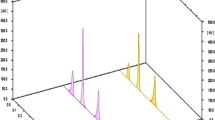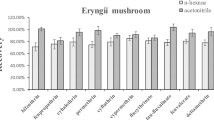Abstract
WE have found that, of the four known isomers of benzene hexachloride, only the gamma is reduced at a dropping mercury electrode. The insecticidal activity of benzene hexachloride is preponderantly due to the gamma-isomer, so that a method of determining the latter is of value in the analysis of benzene hexachloride and insecticidal compositions based on it. This property of the gamma-isomer, which was first discovered by us in 1945, permitted the development of a reliable analytical procedure. Keller et al.1 showed in 1946 that benzene hexachloride gave rise to a polarographic wave, but did not specifically indicate that the wave was due to the gamma-isomer.
This is a preview of subscription content, access via your institution
Access options
Subscribe to this journal
Receive 51 print issues and online access
$199.00 per year
only $3.90 per issue
Buy this article
- Purchase on Springer Link
- Instant access to full article PDF
Prices may be subject to local taxes which are calculated during checkout
Similar content being viewed by others
References
Feller et al., Helv. Chim. Ada, 29, 761 (1946).
Slade, Chem, and Ind., 43, 314 (1945).
Author information
Authors and Affiliations
Rights and permissions
About this article
Cite this article
INGRAM, G., SOUTHERN, H. Polarographic Determination of the Gamma-Isomer of Benzene Hexachloride. Nature 161, 437–438 (1948). https://doi.org/10.1038/161437a0
Issue Date:
DOI: https://doi.org/10.1038/161437a0
This article is cited by
-
Polarography of organohalogen compounds Report 3. Polarography of ?-1,2,3,4,5,6-hexabromocyclohexane and paradiiodobenzene
Bulletin of the Academy of Sciences, USSR Division of Chemical Science (1964)
-
A Polarographic Method for the determination of the Gamma Isomer of Benzene Hexachloride in Cattle Dips
Nature (1954)
-
Zur Analytik desγ-Hexachlorcyclohexans (HCH)
Fresenius' Zeitschrift für analytische Chemie (1953)
-
Quantitative polarographische Bestimmung von ?-Hexachlorcyclohexan
Fresenius' Zeitschrift f�r Analytische Chemie (1951)
Comments
By submitting a comment you agree to abide by our Terms and Community Guidelines. If you find something abusive or that does not comply with our terms or guidelines please flag it as inappropriate.



